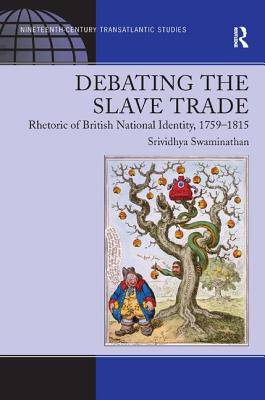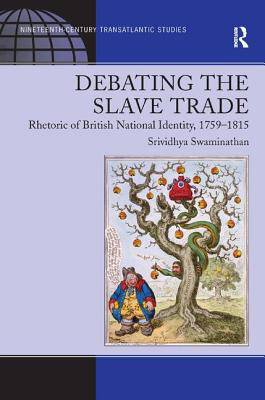
Bedankt voor het vertrouwen het afgelopen jaar! Om jou te bedanken bieden we GRATIS verzending (in België) aan op alles gedurende de hele maand januari.
- Afhalen na 1 uur in een winkel met voorraad
- In januari gratis thuislevering in België
- Ruim aanbod met 7 miljoen producten
Bedankt voor het vertrouwen het afgelopen jaar! Om jou te bedanken bieden we GRATIS verzending (in België) aan op alles gedurende de hele maand januari.
- Afhalen na 1 uur in een winkel met voorraad
- In januari gratis thuislevering in België
- Ruim aanbod met 7 miljoen producten
Zoeken
Debating the Slave Trade
Rhetoric of British National Identity, 1759-1815
Srividhya Swaminathan
Hardcover | Engels
€ 305,45
+ 610 punten
Uitvoering
Omschrijving
How did the arguments developed in the debate to abolish the slave trade help to construct a British national identity and character in the late eighteenth century? Srividhya Swaminathan examines books, pamphlets, and literary works to trace the changes in rhetorical strategies utilized by both sides of the abolitionist debate. Framing them as competing narratives engaged in defining the nature of the Briton, Swaminathan reads the arguments of pro- and anti-abolitionists as a series of dialogues among diverse groups at the center and peripheries of the empire. Arguing that neither side emerged triumphant, Swaminathan suggests that the Briton who emerged from these debates represented a synthesis of arguments, and that the debates to abolish the slave trade are marked by rhetorical transformations defining the image of the Briton as one that led naturally to nineteenth-century imperialism and a sense of global superiority. Because the slave-trade debates were waged openly in print rather than behind the closed doors of Parliament, they exerted a singular influence on the British public. At their height, between 1788 and 1793, publications numbered in the hundreds, spanned every genre, and circulated throughout the empire. Among the voices represented are writers from both sides of the Atlantic in dialogue with one another, such as key African authors like Ignatius Sancho, Phillis Wheatley, and Olaudah Equiano; West India planters and merchants; and Quaker activist Anthony Benezet. Throughout, Swaminathan offers fresh and nuanced readings that eschew the view that the abolition of the slave trade was inevitable or that the ultimate defeat of pro-slavery advocates was absolute.
Specificaties
Betrokkenen
- Auteur(s):
- Uitgeverij:
Inhoud
- Aantal bladzijden:
- 262
- Taal:
- Engels
Eigenschappen
- Productcode (EAN):
- 9780754667674
- Verschijningsdatum:
- 11/09/2009
- Uitvoering:
- Hardcover
- Formaat:
- Genaaid
- Afmetingen:
- 156 mm x 234 mm
- Gewicht:
- 544 g

Alleen bij Standaard Boekhandel
+ 610 punten op je klantenkaart van Standaard Boekhandel
Beoordelingen
We publiceren alleen reviews die voldoen aan de voorwaarden voor reviews. Bekijk onze voorwaarden voor reviews.









